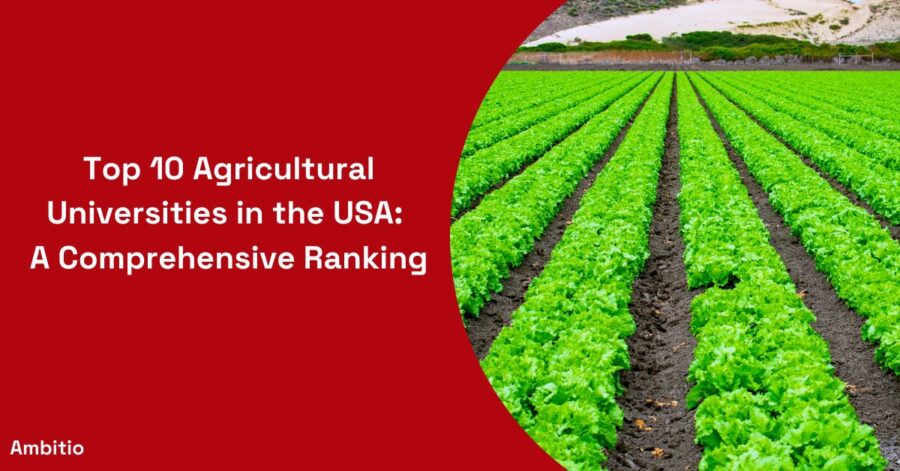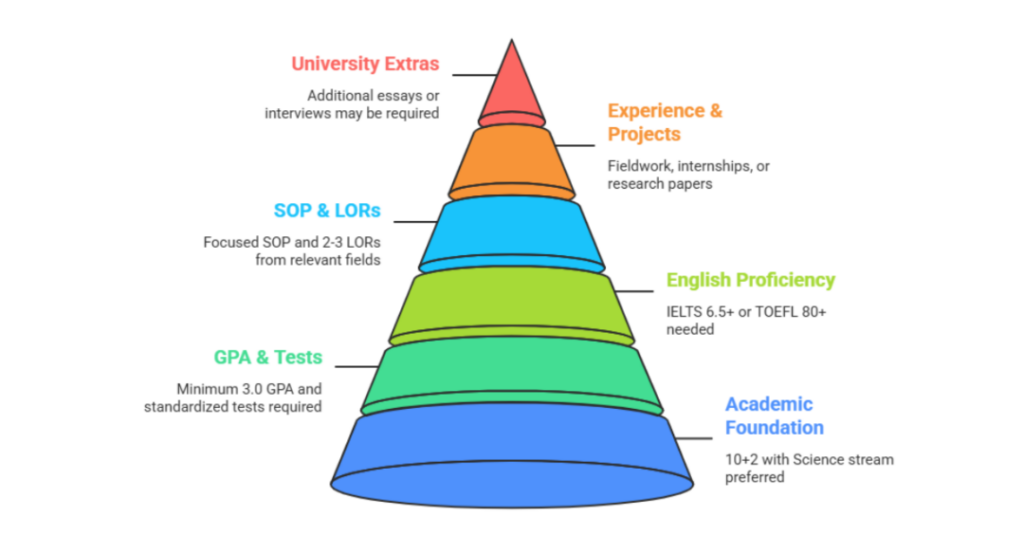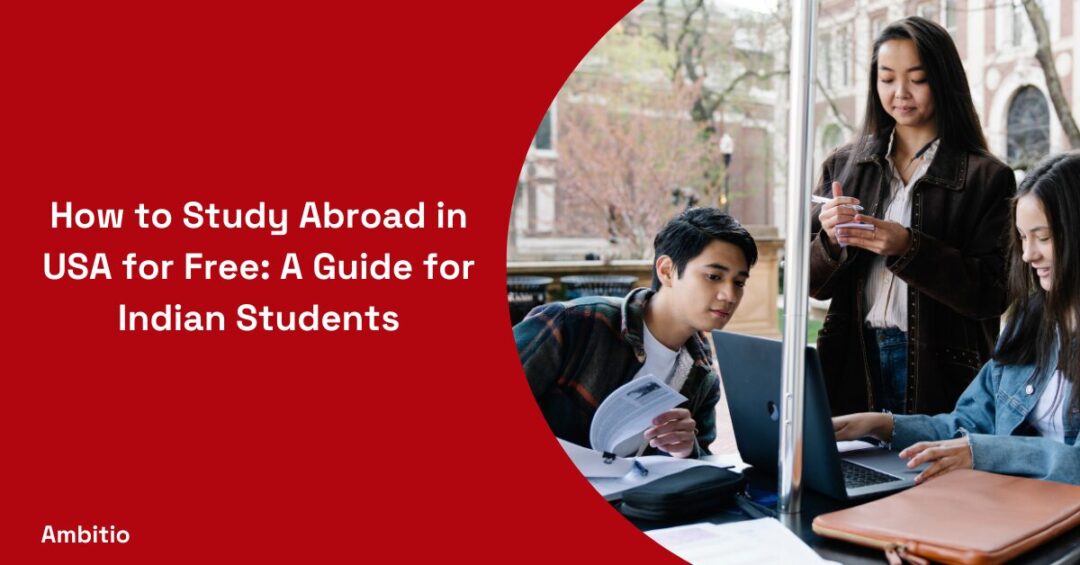29 July 2025
5 minutes read
Top 10 Agricultural Science Universities In USA For Indian Students In 2025

Key Takeaways
- Top 10 agricultural universities in USA offer world-class research, high ROI, and strong career outcomes for Indian students.
- Eligibility includes a solid science background, minimum 3.0 GPA, and strong SOP with relevant agri-experience.
- Application success depends on more than academics—fieldwork, precision agriculture exposure, and fit with programs matter.
$2.4 trillion. That’s the global agri-food industry’s value—and no, it’s not all tractors and hay bales. Behind every breakthrough in crop science, sustainable agriculture, and animal science are researchers from some of the best colleges in the world. If you’re an Indian student dreaming of studying agriculture in the U.S., you’re not just chasing a degree—you’re eyeing a future that literally feeds the world.
But, most Indian students looking to study agriculture and life sciences abroad don’t know where to begin. They scroll through random rankings, hear about Cornell University or Iowa State in passing, and then freeze—confused between agricultural education vs plant sciences, unsure if a university is all theory and no fieldwork. Let’s be real: not every college of agriculture is built equally.
Some have world-class agricultural programs; others are just coasting on legacy. This blog cuts through the noise and gives you exactly what you need—the top agricultural universities that are worth your time, effort, and money in 2025.
What Is The Eligibility Criteria For Top Agricultural Universities In The USA?
So, you thought getting into a college of agricultural studies in the U.S. would be easier than, say, computer science? Think again. The top universities offering programs in agricultural and environmental sciences are no playground. They don’t hand out acceptance letters just because you “love nature” or “grew up near farms.” These schools are producing the next generation of food scientists, climate warriors, and policy makers—and they expect you to show up with more than just good intentions and a green thumb.

From GPA expectations to standardized tests, here’s a no-fluff, straight-up table of what you actually need to get into the best:
| Requirement | Details & Notes |
|---|---|
| Academic Qualification | 10+2 with Science stream; Physics, Chemistry, and Biology or Math are preferred. |
| GPA Requirement | Minimum 3.0 on a 4.0 GPA scale (roughly 75–80% in Indian terms). Top schools may want higher. |
| Standardized Tests | SAT/ACT (for undergrad), GRE (for some MS/PhD programs); check each university’s page. |
| English Proficiency | IELTS (6.5+) / TOEFL iBT (80+) is typically required. Some top universities ask for 100+. |
| Statement of Purpose (SOP) | Statement Of Purpose needs to be focused, specific, and relevant to agriculture, research, or sustainability. |
| Letters of Recommendation (LORs) | Usually 2–3 Letter Of Recommendation from academic teachers or professionals in agriculture-related fields. |
| Relevant Experience/Projects | Fieldwork, internships, agri-projects, or research papers can give you a real edge. |
| Course Prerequisites | Some MS programs in agricultural and environmental sciences require a BSc in Agri or similar background. |
| Portfolio (if applicable) | Required mainly for research-focused or interdisciplinary programs (like agri-tech). |
| University-Specific Extras | Land-grant schools like Michigan State or University of Florida may ask for extra essays or department interviews. |
10 Top Agricultural Universities In USA For Indian Students
The U.S. is home to 6 of the top agricultural universities globally, where Indian students don’t just study agriculture—they shape the future of agriculture and life sciences. These aren’t generic programs—they’re research-driven, tech-backed, and globally ranked to lead tomorrow’s food systems.
From animal science to plant sciences, from agricultural education to environmental science, these institutions offer more than just degrees—they offer transformation. Here’s a breakdown of the 10 top universities in the U.S. for Indian students pursuing an agriculture degree, complete with ranking, average tuition fees, and graduate salaries.
| University Name | Known For | Avg. Tuition Fees (per year) | Avg. Salary After Graduation |
|---|---|---|---|
| Cornell University | Ivy League excellence in agricultural science & agricultural and environmental sciences | $63,000 | $72,000 |
| University of California | #1 globally in agriculture and life sciences, strong in plant sciences and crop science | $46,000 | $68,000 |
| Iowa State University | Leading college of agriculture with top-tier agricultural programs | $28,000 | $62,000 |
| University of Florida | Renowned for sustainable agriculture and animal science | $30,000 | $60,000 |
| Purdue University | Strong industry links in agricultural education and environmental science | $32,000 | $65,000 |
| University of Illinois Urbana-Champaign | Research leader in crop science and agri-engineering | $35,000 | $67,000 |
| University of Wisconsin-Madison | Focused on global food systems and college of agricultural sciences | $39,000 | $63,000 |
| Michigan State University | Known for innovation in agricultural science and sustainable agriculture | $34,000 | $64,000 |
| Oklahoma State University | Practical training in animal science, part of top U.S. college of agriculture network | $26,000 | $58,000 |
| Texas Tech University | Hands-on agriculture degree and strong research in agricultural education | $27,000 | $57,000 |
What Does The Application Process Required To Study Agriculture In USA?
The best colleges for agricultural sciences aren’t handing out acceptances to students who simply “like nature.” With thousands of international students vying for a spot in top agricultural universities, your application needs to be as strong as your ambition to transform agriculture in the USA.
From agriculture education at Texas A&M University to research-driven agriculture programs at University of Illinois Urbana-Champaign, the process to study agriculture in the US requires more than ticking boxes. Here’s a breakdown of how to apply the right way — especially if you’re pursuing an agriculture degree in one of the top 25 colleges in 2025.
Step 1: Pick the Right University — Go Beyond the Rankings
Just because a school ranks in the top 10 agricultural universities doesn’t mean it fits your goals. The college of agricultural and life sciences at University of Idaho may focus on agriculture and food systems, while Texas A&M emphasizes agriculture economics. Match your interests to the programs in agriculture, not just the brand name.
Step 2: Build a Solid Agricultural Profile
Top universities in the USA want more than high marks. Think internships, fieldwork, or projects in precision agriculture. Want into the best agricultural universities? Show practical exposure, not just a textbook record.
Step 3: Know the Academic Requirements
Most colleges and universities need a strong academic background, especially if you’re pursuing agricultural courses at the bachelor’s level (like a BSc in Agriculture). Expect GPA cutoffs, science subjects, and sometimes even subject-specific prerequisites in agricultural and environmental sciences.
Step 4: Prepare Documents That Matter
Beyond your transcript, you’ll need an SOP tailored to agricultural studies, LORs from credible sources, and proof of English proficiency. Some agriculture colleges might ask for additional essays based on your degree in agriculture or research interests.
Step 5: Apply Early, Track Smartly
The top universities for agricultural sciences have rolling or fixed deadlines. Apply early to agriculture colleges with limited intake, and use student portals to track your application. Many universities providing agriculture courses in the USA also require department-specific interviews — don’t miss those.
Conclusion
If you’re serious about studying agricultural sciences in America, don’t follow the herd. Everyone’s talking about Cornell and UC Davis—but few look deeper into schools like Colorado State University, Washington State University, or even Mississippi State University, where the real, gritty work in food systems and sustainability is happening.
Yes, rankings matter. But so does fit. Whether it’s the practical training at Kansas State University or research opportunities at the University of Georgia, each school brings something different to the table. The right choice isn’t about prestige—it’s about where you’ll grow, contribute, and thrive in the next decade of global agriculture. Make your decision with clarity, not noise.t while rankings provide a useful guide, the best institution is one that aligns with your aspirations, values, and dreams for the future of agriculture.
To get into a top U.S. university isn’t just about grades—it’s about strategy. Ambitio’s AI-powered platform and expert consultants help you tackle applications, study gaps, and visa approvals with confidence. No confusion, no wasted time—just a clear path to your dream school. So if you want to study in USA, Ambitio is the answer.
FAQs
Q1: Which university offers the most comprehensive agricultural science program?
While all the listed universities offer comprehensive programs, Cornell University frequently ranks at the top due to its diverse courses and research opportunities.
Q2: Are there scholarships available for students in agricultural universities?
Yes, most of the top agricultural universities provide scholarships based on merit and need.
Q3: Is practical experience a part of the curriculum in these universities?
Absolutely. The top universities emphasize hands-on experience, often through internships, research projects, and fieldwork.
Q4: How do rankings of agricultural universities affect job opportunities post-graduation?
Graduating from a top-ranked university can provide a competitive edge, but skills, knowledge, and experience play crucial roles in job acquisition and growth.
Q5: Can international students apply to these agricultural universities in the USA?
Yes, all of these universities welcome international students and have specific programs to support them.

You can study at top universities worldwide!
Get expert tips and tricks to get into top universities with a free expert session.
Book Your Free 30-Minute Session Now! Book a call now




























